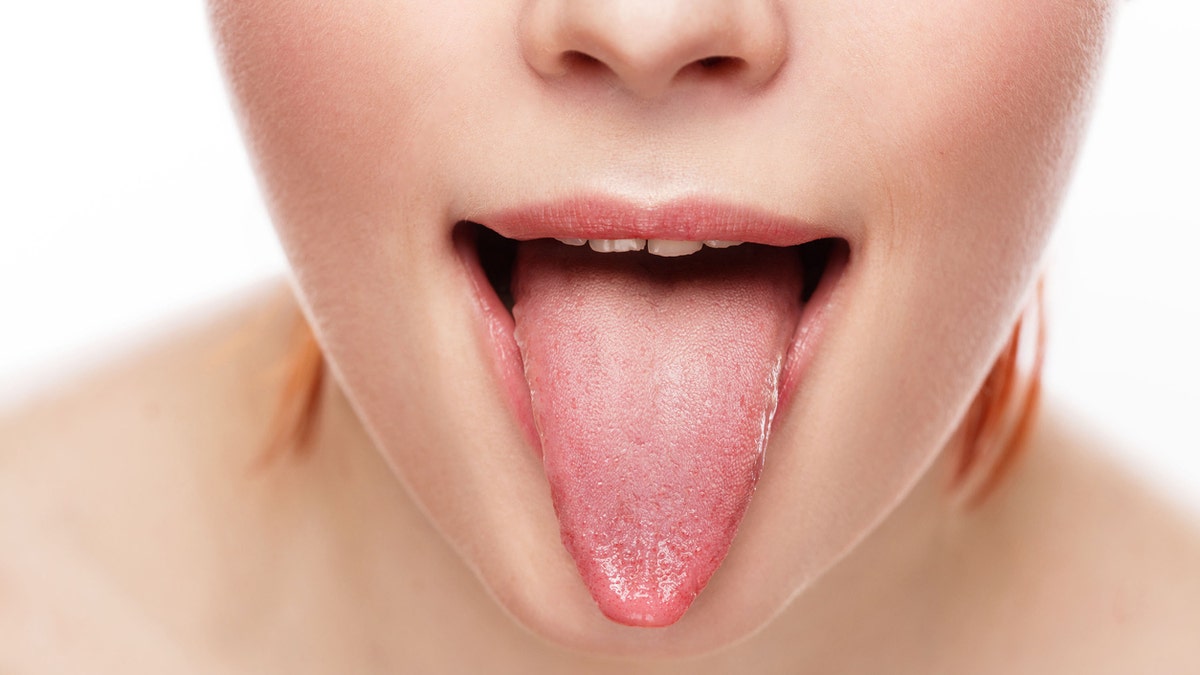
natural tongue open mouth. Studio shot. (iStock)
How’s your tongue feeling today? That question might sound silly, but your tongue can actually tell you a lot about your health.
Chances are that you hardly notice it half the time, but it might change colors or hurt a little if something’s not quite right. Take a look at a few health problems that your tongue might be telling you about.
First of all, a healthy tongue will have a light pink color to it and be covered with tiny bumps called papillae.
PARENTS OF 10-MONTH-OLD BOY WHO WEIGHS AS MUCH AS A 9-YEAR-OLD SEEK HELP
You won’t usually see a strong color or spots and dots coating a normal tongue, and you definitely shouldn’t feel tingling, burning or pain. If you do, these could be signs of a health problem that you’ll want to look into.
Common Tongue Problems:
Fortunately, tongue problems have specific characteristics that help you zero in on the true health issue. You might see:
Strawberry Red
What it means: Unless you just ate a carton of strawberries or a lollipop, a bright red tongue is not a normal color. There’s a few possibilities that might be causing it.
- Vitamin deficiency – Your tongue might be turning a shiny red because it’s losing taste buds. This happens when you’re not getting enough of certain vitamins, namely B-12, folic acid or iron. You’ll need to supplement or eat more foods that contain these vitamins to solve the problem.
- Scarlet fever – If you’re red tongue is accompanying a high fever, you should get checked for this bacterial condition. You might see scarlet fever pop up with strep throat.
- Chronic dryness – If you have an overly dry mouth, you might see an abnormal red. In this case, you’ll just need to take care of the symptoms with over-the-counter or prescription medications.
White All Over
What it means: If you’re noticing what looks like a lumpy blanket of white all over your tongue, you may have a yeast infection (or oral thrush).
Most of the time, oral thrush happens because too many good bacteria are killed by antibiotics, letting yeast take over instead. You do need to see your doctor for prescription anti-fungal medication.
White patches
What it means: You might notice a painless white patch on or underneath your tongue, a spot called leukoplakia. For the most part, you don’t have anything to worry about.
5 SUBTLE SIGNS OF KIDNEY CANCER
However, especially if you’re a smoker, these white spots can be a form of pre-cancer, warning you to take precautions. Be sure to get any abnormal patches cleared by a doctor.
Cracks or wrinkles
What it means: Concerned about deep cracks in the middle or sides of your tongue? What about wrinkles or ridges? You shouldn’t fret over these pesky ridges that often get more pronounced with age.
In themselves, they’re usually harmless. However, you may develop infections if you don’t clean thoroughly enough and if the ridges are deep. Get any abnormal symptoms checked out, such as a foul smell or tongue pain.
Painful sores
What it means: If you have a painful sore in your mouth, it’s likely a canker sore, or mouth ulcer. They’re usually round, shallow and mostly white with a red rim.
If left alone, they usually heal themselves within two weeks, but you’ll want to stay away from spicy or acidic foods until then. Experts don’t know exactly why canker sores happen, but many think that they’re related to stress or damage to mouth tissue.
Red bumps
What it means: Sometimes, you might notice red bumps forming underneath your tongue or on the top or sides. While bumps on the top may be an inflammation of the papillae, red bumps that don’t go away could be a sign of oral cancer. Treat them seriously and schedule a medical evaluation.
Black or brown hair
What it means: Are you worried that your tongue is turning into a hairy monster? The black or brown fuzz is actually not hair. It happens when cells on your tongue multiply before your body can shed them, and then they trap in bacteria from food or drinks more easily.
At the same time, the bacteria growth is likely due to poor hygiene but sometimes signifies poorly managed diabetes or antibiotic overuse. Make sure that you’re brushing your tongue and your teeth several times per day to get rid of the problem.
IS IT BROKEN OR SPRAINED? WHEN TO SEEK HELP
Your tongue says a lot about your health and can signal you of underlying problems like infection or poor hygiene. Normally, you won’t notice anything out the ordinary, but you might see a change in color or feel some pain if something’s wrong. The next time you’re brushing your teeth, take a look at your tongue in the mirror and hear what it has to tell you about your health.
Your tongue says a lot about your health and can signal you of underlying problems like infection or poor hygiene. Normally, you won’t notice anything out the ordinary, but you might see a change in color or feel some pain if something’s wrong. The next time you’re brushing your teeth, take a look at your tongue in the mirror and hear what it has to tell you about your health.
This article first appeared on AskDrManny.com.








































